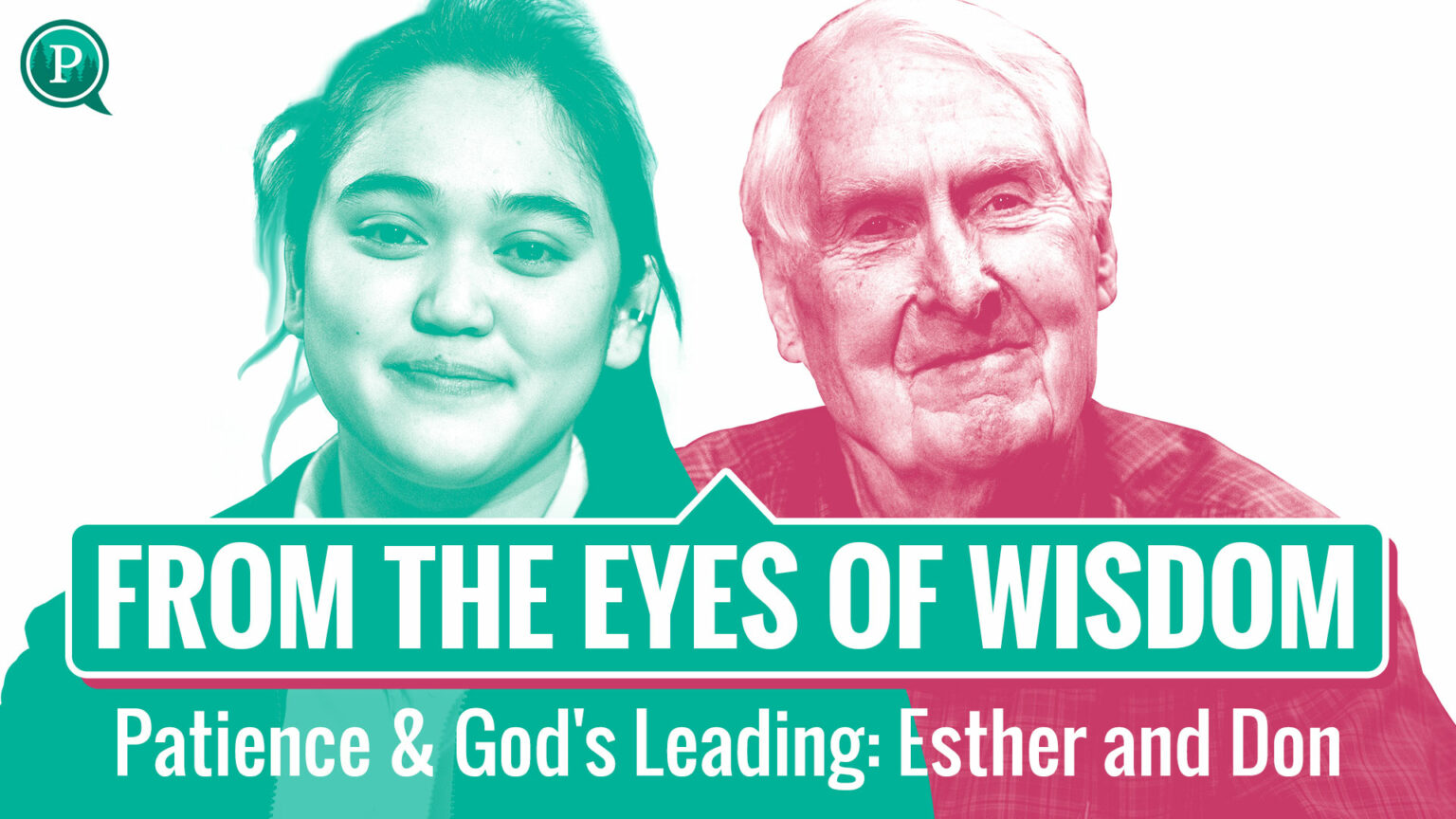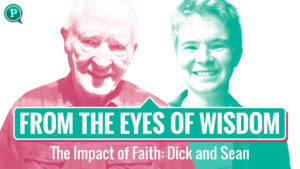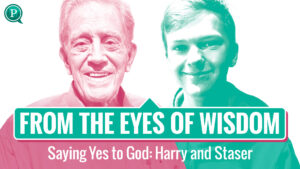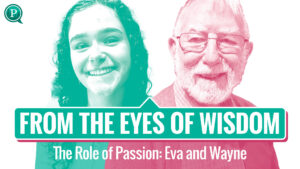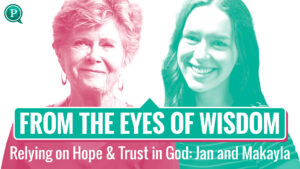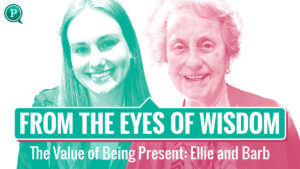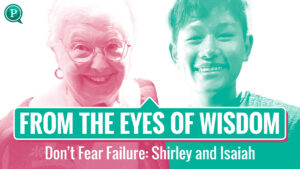Don, a retired doctor with 45 years of experience in the medical field shares his unconventional journey into medicine with high school student, Esther, which began with a scholarship that required him to serve in the military. He later volunteered as a health aide in a hospital, where he learned to empathize with patients and understand their concerns. Don also discusses his decision to work in medical missions, inspired by his wife’s mother who was a missionary. He emphasizes the importance of patience, humility, and silence in one’s spiritual journey as you go through life.
Find Out More:
CRISTA Senior Living | King’s Schools | CRISTA Media | CRISTA Ministries
Transcription:
Sherri Lynn:
Have you ever wished you could know what the future held before you got there? What if you were given the gift of knowledge before you even began your journey? Now, I’ve been thinking about that because I made a lot of stupid mistakes when I was younger, and I wish I had someone to say, “Don’t go down that road. Go down this one.”
I’m Sherri, and welcome to From the Eyes of Wisdom where we are pairing an experienced elder from CRISTA Senior Living with a passionate King’s High Schools students ready to launch into the world. While these conversations won’t tell the future exactly, they did reveal a lot we weren’t expecting about how to live life well. Are you ready? I can’t wait for you to hear this.
All right, time for another episode From the Eyes of Wisdom. I’m so glad to be here with you guys. Today, we have Don with us.
Thank you, Don, for joining us.
Don:
I’m glad to be here.
Sherri Lynn:
Esther is here with us. Thank you, Esther.
Esther:
My pleasure.
Sherri Lynn:
All right, so we’re just going to get some wisdom from Don, get some questions from Esther, kind of get where you want to go in life and where Don has been in life, and we’ll intersect those two together.
Esther, you want to be a doctor?
Esther:
Yes, that’s correct.
Sherri Lynn:
Yes. What made you want to be a doctor?
Esther:
My family history with various medical conditions and also volunteering around those kinds of areas.
Sherri Lynn:
Okay. What kind of volunteer work have you done?
Esther:
I have volunteered at senior centers and food banks where I’ve specifically served seniors.
Sherri Lynn:
Okay, and you felt like, hey, I think I’d like to serve a little more in the medical field?
Esther:
Yes, that’s correct.
Sherri Lynn:
Okay. Do you have a specific area that you want to study in?
Esther:
Yeah. I would love to specialize either in pediatrics or cardiology.
Sherri Lynn:
All right. Don, you did medicine for how long?
Don:
About 45 years, I think.
Sherri Lynn:
45 years. Okay, so Don has a little experience in the medical field. Okay. Tell me how you got started. Did you always want to be a doctor?
Don:
No. No, I had no idea what I wanted to do. When I went to college, I was wide open, and my family wanted me to get a scholarship because we had three kids going through at the same time, and so I got something that gave me complete tuition payment for everything, and then I had to be in the service. I was going to be an officer for three years of active duty afterwards. I think that has some effect on my sense of I need to make a decision and gear toward it right now.
I was on my own, and enjoying the service, learning a lot, being given responsibility, and then I began to think about what is the career I want to embark on. I wasn’t one of those people that knew long ago because of family members or what they’d seen themselves, but I thought back on my mom’s situation and the high blood pressure and the stroke, and then I began to think about the interaction I had seen her make with the family practitioner we had, Dr. Alan Ross, and how supportive he was particularly when she was a widow and how he reassured her and said, “We’re still worried about your blood pressure, but we’re working on this with you.”
I had played sports and had some accidents, and Dr. Ross always patched me up, so I had a feeling of his persona and his capacity to have empathy toward you. When I had an accident, I cut up my mouth pretty bad running into a baseball player, and he said after I went in and worried about how I’d look, he said, “Can you still kiss the girls?” and I had to laugh with him and I thought to myself isn’t that an extraordinary way to take a young guy who’s self-concerned and just say…
Sherri Lynn:
It’s okay.
Don:
… things are going to work out.
Sherri Lynn:
Yeah, so it was this positive interaction with this doctor when you started thinking about what you want to do.
Don:
Yeah. Absolutely. Yep.
Sherri Lynn:
Okay, and so may I ask you, when you’re thinking about family conditions, is there anything specific that you’re looking at medical conditions that make you say, “I want to be a doctor?”
Esther:
My mom has very low blood pressure, so she has fainted a couple of times because of that, and I’ve had to call the ambulance and take care of my siblings while she was at the hospital, so various things like that. Just being in a caretaker position has made me want to be a caretaker for others.
Sherri Lynn:
Okay. All right. Good. All right, so it’s like the same thing where you’re looking and saying, “I see something. I see suffering in my family, and then I see someone who in your position saying, ‘I see someone who helped during that time,’ and I want to be that helper. I want to be a helper.”
Don:
Yeah. There’s one other thing. My dad said to me when I was 15 or 16, “Mom’s got very bad high blood pressure, and I want you to do everything you can to show you care for her and look out for her. We’re hoping things will work out, but every day and week is something we are very glad to have,” and that made a big impact on me, too.
Sherri Lynn:
Wow. You know what? That’s really important. I think that that’s important for teenagers to hear. Every day matters. You know what I mean?
Don:
That’s right. Yeah.
Sherri Lynn:
Every day matters.
Don:
Yeah. They don’t have an aim shot. It’s all open. Yeah.
Sherri Lynn:
Yeah. When you’re young, you’re thinking, “Oh, the world is just open out there,” like it’s just forever, but, thank God, he did that because you did end up losing your mom at a young age.
Don:
Yeah. Absolutely.
Sherri Lynn:
Okay. I remember something in your pre-interview about being… Were you a health aide or was there a hospital and was it Philly or something? Am I remembering that correctly?
Don:
Yeah. After I got out of the Navy, I had decided to try to get into medical school. I was an average college student. I did everything but study hard, and I really enjoyed it.
Sherri Lynn:
You enjoyed everything but studying.
Don:
I wasn’t a pre-med, you see.
Sherri Lynn:
Okay. Right. Right. Oh, okay.
Don:
The kids in my class that were pre-meds, you never saw them.
Sherri Lynn:
Because they were studying.
Don:
They were studying, and they were competitive and they wanted to get the MSAT Chem Cast and Bang Bang Back.
Sherri Lynn:
That’s when you were still in school.
Don:
Yeah.
Esther:
Yeah. Hey, I’m about to go through that.
Don:
I could understand that. I knew some of them very well and was friends with them, but I thought they missed out in a way. They didn’t have other things they enjoyed doing. Anyway, I got out, and my brother who was studying architecture said, “Why don’t you come roommate with me at the University of Pennsylvania?” I had never been there, and so I went and roomed with him, but I started taking my pre-med courses I hadn’t taken. I’d taken a year of physics, but nothing else. I took all my pre-med courses in one year. I had 60 credits in one year, but I was unsure. I didn’t know a lot about medicine, so I worked as a volunteer health aide in the hospital, and I worked under the senior nursing person. I worked a shift from 1:00 in the afternoon to 11:00 at night five days a week, and I did everything. I did the preoperative preps, shaving. I did enemas. I helped the nurses move inoperable patients and non-mobile patients.
Sherri Lynn:
Now, this is interesting to me. When I was listening to your pre-interview, what was interesting to me was you’re really coming into this, you’re not coming into this like Esther who is like, “This is what I want to do.” You have had no experience in any of this.
Don:
So I wanted to get the experience, and so my motivation for doing that was I want to see how I deal with sick people.
Sherri Lynn:
Yeah. What’d you learn?
Don:
Well, they shared things with me that they weren’t saying to the doctor or the nurses. I was at the bottom of the totem pole. I was just an aide and I was helping them get dressed or whatever.
Sherri Lynn:
What did you take from that experience and say, “This is how I’m going to be a doctor?”
Don:
Yeah. Well, I learned to use a lot of non-visual clues.
Sherri Lynn:
Huh, non-visual clues?
Don:
I’d look at their expressions, their posture. They might be putting on a little bravado, particularly the men. I would look for that and then I’d try to reassure them, and then I’d say, “What are some of your concerns?” The other thing is I would really wait. One of the problems in a clinician situation, you have a lot of patients to see and you’re using your time as effectively as you can, and for you to slow down and step back and say, “There’s something going on here that I don’t understand,” and just step back-
Sherri Lynn:
That’s important for you to know.
Don:
… and say, “Yeah, what else could concern you about what we’ve been doing? I’d like to hear your opinion about this.” I was always interested in a team-collateral approach. It takes more time, but you can step away from the routine stuff and say, “Anything else that you haven’t expressed to people or you’re worried about?”
Sherri Lynn:
That is interesting, and I think that’s something good for you to know, Esther, is to say, “Okay, all of this stuff that’s happening when I’m not a doctor can still inform,” if I’m hearing you correctly, Don, “can inform the way I perform this profession when I become a doctor. I can take all of this information and I can use it as a way to be a doctor,” because you wouldn’t have known to ask those questions or to slow down or any of that if you hadn’t had that job.
Don:
That’s exactly right. I think what I would sum that up is saying is that I had developed a sense of empathy.
Sherri Lynn:
Yeah. There’s the word. Yeah.
Don:
I could put myself in their shoes because I had heard people talking about what it’s like to be in these shoes.
Sherri Lynn:
Yeah, so let’s get to you meeting your wife. Tell me where you met her and how, the two of you?
Don:
Well, I had always looked for a place of worship in college, in the service. When I was doing my pre-med and so on, my brother and I both found a church. I liked to sing, and this church had a very good choir, so I got into that and I went. They had a once-a-month graduate student dinner. I was a bachelor looking for food that someone else had prepared, so my brother and I always showed up. One evening we get there a little late, and there’s one seat next to this table of seven or eight people, and this young lady, I asked, “Is this seat taken?” and she said, “No. You’re welcome to.” That was my future wife.
Sherri Lynn:
I’m going to fast-forward a little bit to the two of you together. When did you start thinking, okay, doctor and then also medical missions? When did your mind start thinking like that was, because that was during when you were still in college, right?
Don:
No. That was really when I was in medical school.
Sherri Lynn:
When you were in medical school, yes, yeah, yeah, you started thinking medical missions.
Don:
It was also after I was married to Sheila.
Sherri Lynn:
Right, that I knew, yes.
Don:
Yeah, because you had to match things up with your partner. Really, this is not a one-person show. It turned out that her mother, Valla McLean, had been a missionary to the Yukon as a young woman. I had met Mrs. McLean. Of course, she’s my mother-in-Law, and I really liked her a lot. We used to ask some stories about what was that like.
I’d always been interested in other countries, other people, other lifestyles. I was training in internal medicine. I’d been in Boston for a few years, and then I came out here to UDub, and I finished that and had done something in especially called infectious disease because I’d always been interested in exotic infections. This is gradual process at least for me. I had some light on my pathway, but it was just a footstep ahead of me. Sheila was a Canadian, and I said, “I’ve been asked if I’d like to do a medical internship in a British hospital midway through medical school, and would you enjoy that?” because that’s her mother country. She said, “Oh, that’d been fun,” and she had never traveled, so we went over. Some of the patients I saw in a London hospital were from overseas, and I got talking with them.
Sherri Lynn:
Did you feel a call for that?
Don:
Yeah. Definitely. I might not have called it a call at that time.
Sherri Lynn:
Okay, at the time, yeah, yeah.
Don:
I might’ve felt a little nudge. God presents Himself to match you.
Sherri Lynn:
Yeah. Right. Right.
Don:
He matches me by saying-
Sherri Lynn:
God presents himself to match you. You should write that.
Esther:
Yeah, I should.
Sherri Lynn:
Yeah. Yeah.
Don:
Sheila, it was a harder decision in some sense because she was going for a PhD, but God had also blessed us with a little girl my fourth year in medical school. That kept her pretty busy for a while. This is how it worked out. We felt stronger and stronger about this, and then I came out to UDub to take my final internal medicine residency. I’d been talking to Sheila about this, and she said, “Don, we’ve been having many blessings, and it’s time to share some of our blessings. Pass it over. Pass it on,” and so I said, “Well, I’ll go talk to the dean here at UDub.” I went up and talked to him and I said, “Our plan is unclear, but do you have any people asking for physicians to come and serve in underdeveloped countries?”
I’m kind of interested in Africa among other options, and so he said, “I don’t have anything right now.” They’re really interested in surgeons. You come in and you do something right away. Internists, they probably have some people that can do that sort of thing, and I said, “Well, keep in touch.” I gave him my number and so on. Four hours later, I got a telephone call, and this voice says, “My name is Dennis Carlson. I’m a medical school grad from UDub. I’ve been a missionary in Ethiopia, and based on my first five years of what I was dealing with, I got more and more interested in public health, so came back and did a master’s in public health, and now I’m back in Ethiopia. I’m the dean of the public health college here, and I’m recruiting for an internist.”
Sherri Lynn:
Oh, my goodness. Well, there’s that.
Don:
I said, “Well, I think that we would like to meet with you and have a cup of coffee,” and then he said two things that interested me. He said, “We’re here to share our training and experience with Ethiopian doctors who have been trained but haven’t had perhaps as much training as we have, but we’re interested in replacing all the expatriates on our faculty within four years. We want Ethiopians to take over and be the in total faculty,” and so I right away had my attention on that, that this is not-
Sherri Lynn:
That was something you were interested in.
Don:
In terms of sustainability, but also his vision. I want to get the Ethiopians to run this place themselves, but we knew we had had more opportunities, so we signed up for that. Before I agreed, I said, “Now, my wife has been doing a PhD in history,” and a dentist looked at Sheila and he said, “Now, Sheila, you must like books. History, you do a lot of reading, don’t you?” and she said, “Absolutely.” He said, “We’re looking for a librarian,” and she said, “Oh,” and he said, “Now, we don’t need Don for one year. We have a guy doing the internal medicine for the next year, but then I’d like to get him. You could start a master’s in librarianship here at UDub right now. You’d learn enough in a year to be able to run our program,” and then he baited the hook and he said, “I’ve gone to USAID and they’ve granted us $50,000 to rebook our whole library at the Public Health College, and you’d be in charge of ordering everything.”
Sherri Lynn:
That was it, right?
Don:
She said, “That sounds challenging.” Anyway, she took it and we went, and then she came back and finished that. We were there three years. We had two little kids when we went. We had a two-year-old and a four-year-old.
Sherri Lynn:
Wow. I love these stories because, at your age, you have I’m sure a vision of the things that you want to do and the way you want to do them. I’m just kind of thinking through. Don’s story already shows this windy road that God puts us on, and I wonder if you have any questions or thoughts about that.
Esther:
Yeah. Hearing about this, it’s very a non-traditional route.
Sherri Lynn:
Yeah. That’s what I hope you get from this so that, in 10 years, 12 years, you’re on a road where you’re like, “Where am I going? What is happening? It seems weird. It’s more than I can take,” whatever the case may be because that will happen in life. I hope that you will remember sitting next to Don, which means God brought him through, and he’s fine. He’s here, which means God is faithful because you’re here and, to remember, I think that’s part of us always recalling God’s faithfulness. That’s why I like this is that a person who has experienced God’s faithfulness can say to someone who was starting out on the road, “I’m telling you God is faithful because I’ve experienced God’s faithfulness.” You can say it. You can say it because you’ve lived it.
Don:
Yeah. I think the other thing, and this is what, the elders, they’ve done more reading, too. One of my favorite quotations from a Christian is, “God works in you slowly.”
Esther:
That’s good.
Sherri Lynn:
I’m going to write that down myself.
Don:
Because we’re impatient people, our culture is impatient, and we think, “I think I’d like that door to open,” or, “I need some support over here. I’m not sure how this is going to happen,” and then we realized when we look back He was already on that. He’s always been on that.
Sherri Lynn:
He was, and He’s not on our time schedule.
Don:
One of the things that I value, when you work in different countries, you’re trying to learn from them. You listen to their folk stories. You look at their life circumstances, and you’re learning all the time. The big thing, we were in a very rural area and there were a lot of sheep out there, and I was struck that little boys were set out to take care of the sheep when they were seven or eight years old. These are scrawny little kids with raggedy clothes. That’s their job, and they’re in big trouble if they don’t know if a sheep is missing, if they don’t know what happened to it.
I got very interested in some of the Bible stories and so on, and the one that is, “I am the Good Shepherd.” When you’re in these places, you start to look at that and then realize He’s always there looking after His sheep like these little kids are.
Sherri Lynn:
Oh, my goodness, yes.
Don:
What do I take away from that? He’s doing that for us, too. You do something, a little hesitant step, and your cup overflows, and it’s had a profound-
Sherri Lynn:
Wait a minute. Me and Esther’s writing that down, “A hesitant step and your cup overflows.” Esther, are you writing that down?
Esther:
Yep.
Sherri Lynn:
She’s already written down so much, so have I, but I always ask our elders, “If you had one piece of advice, one thing that Esther is going to need, undergrad, med school residency, maybe she’ll decide medical missions. I’m not going to push that on you. I’m just going to tell you have yourself open because that’s what it sounded like Don had. Have yourself open. If there’s one thing, she’s going to have this card with her all the time, she’s taking that card with her. She’s going to be 28 and have that card with her. If there’s one thing that you’re like this is what you need to know, what would it be?
Don:
Yeah. Ask God to guide you-
Sherri Lynn:
Ask God to guide you.
Don:
… because you’re going to be in lots of situations, and be patient because it may not come to you as a word. My wife right now is having major health problems, but one of the senses I’ve had, not a verbal word from God, but I was sharing with Him that I was saddened about her decline, but I was grateful for 64 years being married to a wonderful woman and these children and all our blessings. I had the sense, and I can’t really say it was anything more. He’d already picked Sheila up, and that’s a little bit of that Good Shepherd image. He’d already picked up this little sheep and He was walking with her when I’d done what I could, but I was not going to change the circumstance. We’re just all walking along together, but He’s doing most of the caring.
Sherri Lynn:
Yeah, because he’s the Good Shepherd.
Don:
Yeah. I guess the only other thing is, and I’m not real good at this myself, a really wonderful spiritual practice is the practice of silence and the more you can learn about it’s also solitude, being comfortable with being alone. Even in a crowded room, you can be completely in solitude. The silence is you know your mind is churning over and you got stuff coming at you all the time. It’s just trying to relax, breathe slowly and find a place and a time. It’s a hard discipline. It is a hard discipline, but I think humility and silence are the two great virtues.
Esther:
When you talk about practicing silence, how would you say you posture yourself before God in that moment? Are you expecting, or maybe not even expecting, just listening for His voice and just meditating on His word during that time, or is it just time to rest and be in peace?
Don:
Yeah. Well, there’s several different ways of doing that. There’s good stuff on all our wonderful internet. Some of them is that you’ll pick certain biblical narratives that appeal to you, and you’ll just reflect on that. Some people use a certain phrase, “Jesus, Son of God, have mercy on me. Jesus, son of God, have mercy on me,” so there’s sort of a mantra that you’re going through, and then you start to release that.
Other ones are you just say, “I’m here and you’re here. I’m going to relax and I’m going to try to let go. I’m going to try to unplug, and I’d love you to come in here, but if I don’t hear anything or sense anything special, I am still here for you. I know you want me to be here and you’d like to spend time with me, so here I am, and whatever you want to do,” in God’s slow time and then, maybe two weeks later, something will happen and you’ll say, “Aha.” The shortest prayer is could you, “Thank you,” in anticipation and then lowercase or capital letters, “Wow.”
Sherri Lynn:
Don, thank you so much and, Esther, thank you so much. This has been such a rich, rich, rich episode. I know, as you’re listening or watching on YouTube, I’m sure you’ve gotten so much out of it like we have. Esther, put your card up to the camera. If you’re listening, you can’t see it, but Esther got it. The camera is right here. I think, yeah, Esther got front, back, side. She’s written a lot of notes from what Don has written, and so have I. I can show mine, too. I got notes, too, so.
Thank you all so much, and the next episode of From the Eyes of Wisdom, we’ll get even more wisdom. Thank you guys for joining us.
Follow this podcast:

